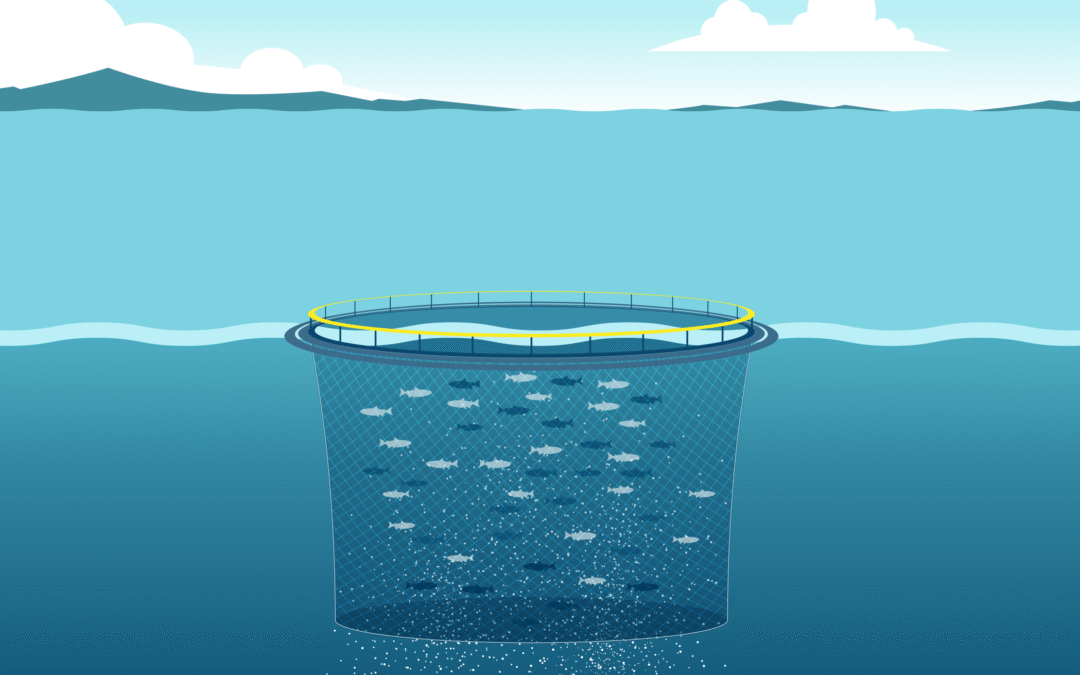Earth and Environment
Explore Earth and Environment

Healthy Streams, Stronger Farms: A Conservation Plan for the Mississippi Alluvial Valley
The streams and rivers of the Mississippi Alluvial Valley were once teeming with life. In the early 1800s, naturalist John J. Audubon described beautiful waters “covered with thousands of geese and ducks, and filled with fish.” Now, after more than a century of human activity, many of these waterways are struggling.

How Biomolecular Solutions Can Make Fish Farming Sustainable
Fish farming has become one of the fastest-growing sources of food in the world, providing nearly half of all fish consumed globally. Yet behind this success lies a complex set of challenges. Intensive aquaculture can strain ecosystems, spread diseases, and increase dependence on antibiotics and chemicals that harm both fish and the environment. As climate change and rising demand for seafood put even more pressure on aquatic systems, scientists and producers are searching for smarter, more sustainable ways to farm fish without compromising animal welfare or water quality. Across Europe, a pioneering initiative called BioAqua COST Action, funded by the European Union, is working to meet this challenge.

Dr Benjamin Blanz | Protecting Fish Stocks with Smarter Risk Management
Fisheries are a vital source of food, livelihoods, and cultural identity for many communities across the globe. Unfortunately, fish stocks are collapsing, despite management plans designed to ensure sustainability based on rigorous stock assessments. These collapses devastate ecosystems and the communities that rely on them, raising an urgent need to balance competing demands for fish with preserving stocks for the future. Dr Benjamin Blanz at the University of Hamburg and his collaborators are taking a new approach to this challenge.

Dr Simon Hoeg | Understanding the Future of Pre-Alpine Water in a Changing Climate
In the Pre-Alpine valleys of Switzerland, the water that flows through streams doesn’t all come from the same source. Some of this water might be today’s rain, while some is yesterday’s snowmelt. Another significant proportion has been moving underground for weeks, filtering through soils, forests, and rocks before making its way into streams and rivers. Understanding these different water sources and their varying proportions helps us to understand how rivers respond to the effects of climate change, and how reliable our water supplies will be in the future. This is the focus of an important new study by Dr Simon Hoeg of Panorama Water Research.

Dr. Hubert Untersteiner | A Smart and Safe Method to Assess Pesticide Risks to Aquatic Life
Imagine rivers and lakes, vital for life, threatened by invisible dangers: pesticides. How do we accurately assess their risk to aquatic ecosystems without endless, costly, and ethically challenging animal tests? Scientists are increasingly finding answers in powerful computer models. A new study carried out by Dr. Hubert Untersteiner and colleagues from the University of Ulster shows how combining two types of computer-modelling tools can improve predictions of pesticide toxicity in aquatic environments. The two methods they combined are Quantitative Structure–Activity Relationship (or QSAR), and Species Sensitivity Distribution (or SSD).

How COVID-19 Shaped Conservation Activism in Southern Africa
The COVID-19 pandemic influenced social structures and behaviours globally, reshaping how communities interact and mobilize. It also significantly transformed social movements across the world, creating new patterns of digital activism as essential tools during times of physical distancing and restricted movement. During this global shift, social media amplified indigenous voices in conservation, but turning this digital momentum into real policy impact remains a challenge. Despite safeguarding 80% of global biodiversity, these communities are often excluded from environmental decision-making, underscoring the need for digital advocacy to support their rights and heritage.

Dr Jiantong Li | Revolutionising Renewable Energy Storage with Micro-supercapacitors
Harvesting mechanical energy from Earth’s natural environment is a clean and sustainable way to produce power. While wind is the most well-known form of mechanical energy that can be converted into electrical energy, it can originate from various sources, including ocean waves, falling water droplets, and even human motion. The challenge with this approach is that none of these sources are available all the time. Even when they are available, the amount of energy they produce can vary drastically. This inherent randomness produces pulsed electrical signals with irregular amplitudes and frequencies, which aren’t well suited for use in electrical devices.

Dr. Allen Place | Small but Deadly: The Story of Karlodinium veneficum
The oceans are vast and teeming with life, but survival in this watery realm is no less competitive than on land. Among the ocean’s myriad inhabitants are dinoflagellates, tiny single-celled organisms that play a crucial role in marine ecosystems. Despite their minuscule size, some dinoflagellates possess extraordinary biochemical weaponry. One of the most fascinating examples is Karlodinium veneficum, a species armed with potent toxins known as karlotoxins. These molecular marvels enable K. veneficum to thrive by allowing it to prey on smaller organisms and warding off predators.

Dr. Kurt Vollmer | Weeding Out the Competition: The Promise of Cover Crops in Sustainable Agriculture
Agriculture today faces mounting challenges. Climate change, soil degradation, and the spread of herbicide-resistant weeds threaten productivity and sustainability. However, a promising and natural solution is gaining momentum: cover crops. These plants, grown to improve soil and suppress weeds rather than for harvest, are proving to be powerful allies for farmers striving to protect the environment while maintaining high yields

Dr. Chandrika Varadachari | Caged Urea: A Smart Fertilizer That Boosts Crop Yields and Protects the Environment
In an era of increasing urgency to address environmental degradation, the impact of conventional agricultural practices has come under scrutiny. Synthetic nitrogen-based fertilizers, such as urea, are essential for feeding the global population, but cause significant environmental damage. Nitrogen from urea-based fertilizers often finds its way into water bodies, contributing to pollution. Meanwhile, urea can transform into nitrous oxide gases, which accelerate climate change when released into the atmosphere.

Professor Anne Poelina | The Key to Solving Climate Change May Lie in Indigenous Wisdom
In the Kimberley region of Western Australia, Indigenous First Australians are partnering with researchers to pioneer environmental planning and management. By blending ancient wisdom, Indigenous First Law and Indigenous science with Western science, they’re reimagining our relationship with nature and climate action. Professor Anne Poelina of the Nulungu Research Institute at the University of Notre Dame Australia argues that the key to our planet’s future may lie in Indigenous knowledge and wisdom.

Dr. Naoko Kurata | Beyond the Surface: How Marine Bacteria Influence Sea Slicks
The surface layer of the ocean, teeming with microscopic life, plays a crucial role in global processes such as climate regulation. Marine bacteria in these layers are of particular interest to scientists due to their impact on various oceanic processes. These bacteria play important roles in the production and decay of substances called surfactants. In turn, surfactants influence the formation of sea slicks – which are areas of calmer waters visible on the ocean’s surface. Surfactants affect how the ocean and atmosphere interact, influencing the exchange of greenhouse gases such as carbon dioxide. They also help produce marine aerosols, tiny particles that impact cloud formation and climate.
Stay Up To Date With SciTube
